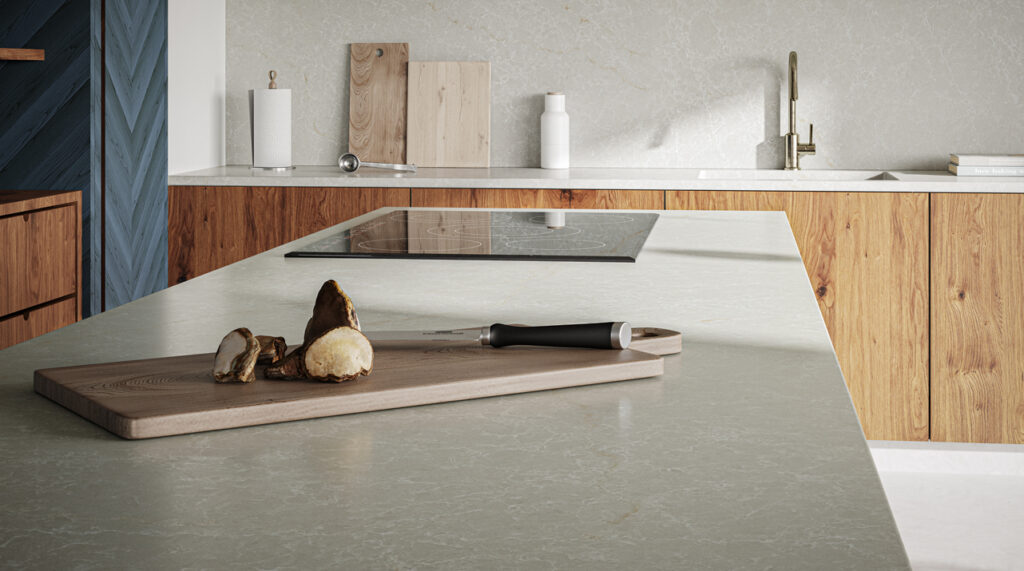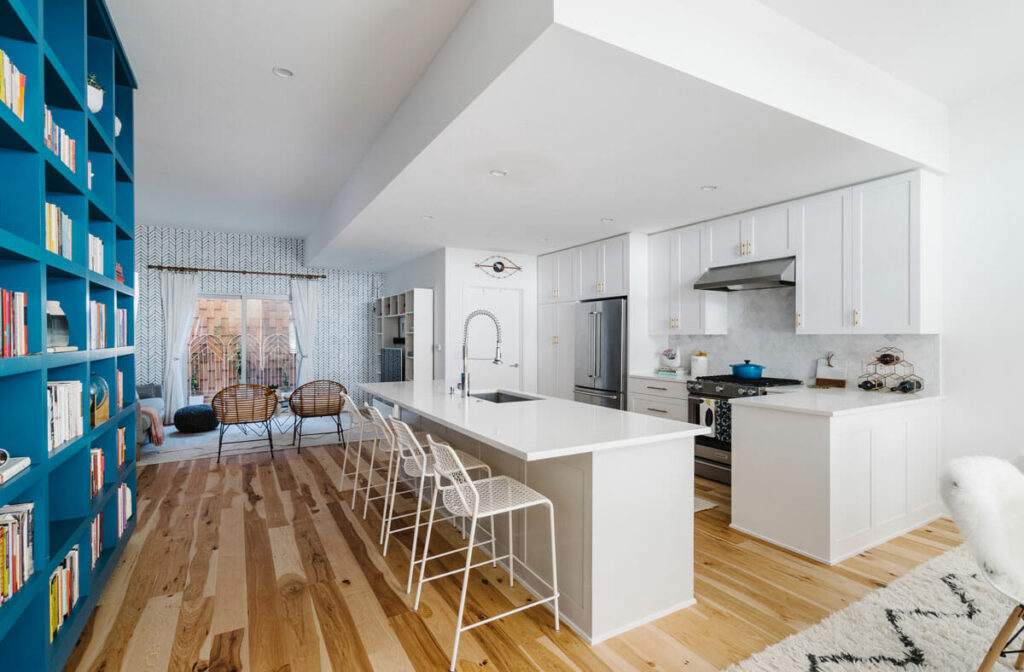Types of Kitchen Countertops and Design Ideas
9 min read
With plenty of countertop options to browse, deciding on just one design can be a challenge.
Your countertop is an essential part of achieving your dream kitchen. At Caesarstone, we understand this. As the premium countertop manufacturer of choice for interior designers and homeowners, we take extra care to ensure our clients are satisfied with their selected pieces.
In this post, we’ll walk you through the various countertop types in the market and their general strengths and weaknesses. Once you know all your options, you may have a specific kitchen countertop type in mind to help you narrow your selection.
Laminate countertops are made by bonding layers of plastic laminate to a particleboard or plywood base. These countertops are popular for their easy installation and versatile design options. Under the laminate, manufacturers can use various colors, patterns, and finishes that mimic natural materials.
| Pros | Cons |
| Price: Laminate countertops are the cheapest option in the market. Design: Laminate is also very easy to find in a plethora of designs since manufacturers can easily make laminate designs. | Easily Damaged: The composition of laminate countertops makes them very susceptible to damage, such as warping, bubbling, scratches, or splitting. Frequent Replacement: Easy damage means more frequent replacements, which can add up and negate any initial savings from choosing cheaper material. Superficial Resemblance: You can use laminate images of premium materials such as quartz and marble, but many laminate slabs are easily distinguishable from genuine premium countertop materials. |
Marble countertops are natural stone surfaces made from metamorphic rock composed of recrystallized minerals such as calcite and dolomite. They are a popular choice for luxurious kitchens and bathrooms for their elegant appearance and smooth texture.
| Pros | Cons |
| Aesthetic: Marble is known for its classic, luxurious aesthetic. This is why it’s the material of choice for iconic sculptures. | High Maintenance: Marble is expensive to buy and maintain. Its porosity requires regular sealing to prevent water damage. It also has weaker resistance to scratches, especially compared to other materials that cost less. Impractical for Everyday Kitchens: Because it’s prone to damage, it may need costly repairs after regular wear and tear. Compared to other materials, the cost of repairing marble is relatively high. |
Since we’ve already covered marble, let’s talk about some of the average and common stone countertops worth mentioning. These natural stones can be sourced worldwide, including in the United States. Since they have similar pros and cons, we can assess them together. These include:
| Pros | Cons |
| Unique Design: Different stone materials have their own unique natural beauty. Some buyers can appreciate adding one-of-a-kind countertop designs to their kitchen. | High Maintenance: Natural stone requires regular resealing and special maintenance. Popularity: Stone countertops like granite have become less popular for durable kitchen countertops. Read about our comparison of quartz versus granite. |
Often referred to as engineered stone, quartz countertops are the most flexible and in-demand high-end surfaces in today’s market. At Caesarstone, we manufacture quartz with approximately 90% raw quartz and various resins. This blend is then shaped into the conventional slab form for countertops.
| Pros | Cons |
| Versatile Design: Caesarstone offers a diverse collection of designs suitable for all themes and aesthetics. Our pieces range from white marble quartz to surfaces resembling concrete. Durability: Quartz is as strong as steel, making it highly durable for everyday kitchen use. Resealing is not required, and its non-porous features make it resistant to water damage, stains, and mold. Value: Quartz countertops are a desired feature in properties. Installing these can benefit your kitchen if you decide to sell your home. | Cost: Most quartz pieces have the same price as granite slabs. However, quartz offers more durability, low maintenance, and quality than other premium stone countertops. Requires Proper Care: Some basic care practices are needed to maintain the quality and durability of quartz countertops. |

Resin countertops are a type of synthetic surface made from a combination of materials, including acrylic, epoxy, or polyester resins, which are mixed with fillers and pigments. They often come in kits and are a popular choice for DIY-ers. However, you should know and understand their downsides before you select this option.
| Pros | Cons |
| Fun and Personalized Project: Because resin countertops can be made with DIY kits, they can be a fun project for those who prefer to DIY their home improvement. Durability: Resin countertops offer moderate durability and resistance to stains, burns, and scratches. | Quality: Epoxy countertops can be messy, especially for those with little experience handling resin. Additionally, these countertops must be made on-site and cured directly on your surface. Difficult: DIY epoxy kits can be deceiving about how easy they are to make and install yourself. Inconsistent Results: Achieving flawless results requires skill and prior experience with resin. Those who don’t will likely end up with substandard countertops and issues such as bubbling. Overall Cost: Resit kits can be priced between $100 to $200. If you have no experience and outsource the work to someone, the overall cost isn’t practical as it’s on par with quality slab options. |
Wood countertops, also known as butcher block countertops, are functional and stylish surfaces made from various hardwood species. Durable and versatile, they provide a warm, natural aesthetic and are ideal for food preparation and dining spaces. Though aesthetically unique, they come with their own pros and cons.
| Pros | Cons |
| Unique Design: There’s no competing with the unique kitchen design of wooden countertops. No other material can mimic the look and aesthetic. | Maintenance: Wood is highly porous, which can lead to water damage, moisture absorption, and mold and bacteria infestation. This makes it very impractical for everyday kitchens as it will require special maintenance. Scratches and Damage: Wood scratches very easily, especially compared to stone surfaces. It is also prone to warping when exposed to too much moisture and humidity. Cost: Despite these unique downsides, wood countertops are just as expensive as premium stone options. For many everyday homeowners, wood countertops are not worth it unless they have a practical reason for installing them. |
Concrete countertops are a type of surface made from a mixture of cement, aggregates, water, and pigments. They can be molded into unique shapes, stained or colored, and polished or textured to achieve a specific aesthetic.
| Pros | Cons |
| Lightweight: Advanced concrete products allow them to form into lighter slabs, making them a practical option. Durability: Concrete is very durable and resistant to chipping or cracking. | Unrefined Appearance: Basic concrete slabs can look and feel unrefined. Despite having similar prices, it doesn’t have the same luxurious appeal as quartz slabs resembling concrete. Porosity: Concrete is porous, like several other stone countertops. This means it requires sealing to prevent water damage and staining. |
Solid surface countertops are artificial surfaces made from a blend of natural and filler materials. Typically, they are acrylic and come in various brands. Learn more about solid surface countertops and read a direct comparison of quartz and Corian.
| Pros | Cons |
| Cost: Solid surfaces are relatively affordable. Appearance: These come in various styles and offer better visual appeal compared to laminate. | Low Durability: Solid surface countertops are less resistant to heat or scratches than quartz. |
Having explored the advantages and disadvantages of various kitchen countertop materials, let’s examine the costs associated with each type.
| Type | Average Price Per Square Foot |
| Laminate | $20-$50 |
| Marble | $40-$140 |
| Quartz | $100-$150 |
| Stone | $40-$200 |
| Resin | $100-$200 per kit |
| Butcher’s Block | $35-$200 |
| Concrete | $70-$150 |
| Solid Surface | $75-$120 |
Factors like brand, customization, and thickness can significantly raise the actual costs you might find on the market. There are also premium and rare stone versions for many of these materials, which come at a higher price.
There are two general types of kitchen countertops: engineered and natural.
| Engineered | Natural |
| Quartz Solid Surface Laminate Concrete | Granite Marble Gabbro Quartzite |
Quartz is engineered with natural materials, so you’re only limited by what designers can craft. At Caesarstone, we offer a vast collection of quartz countertops that resemble granite, marble, concrete, and other stone materials while maintaining quality and durability.
Industry professionals regard quartz as the superior countertop material due to its enhanced stain resistance, versatility, and long-term cost-effectiveness. Consequently, the popularity of granite is diminishing, significantly impacting its resale value.

Laminate is one of the most affordable countertop materials available. Nonetheless, it is essential to remember that it tends to get damaged more quickly compared to premium options such as Caesarstone’s quartz slabs. While laminate is cheaper initially, quartz countertops offer more value in the long run in repairs and replacements.
If you’re looking for quality, longevity, and value for your investment, Caesarstone quartz is tough to surpass. Caesarstone quartz countertops are available in numerous designs, making them perfect for practically any kitchen design you can imagine.
Caesarstone quartz offers effortless maintenance. It doesn’t require resealing as it has non-porous properties. This ensures its resistance to stains and water damage. With very minimal care, your Caesarstone quartz countertop should last a long time.
Among the most heat-resistant substances for crafting kitchen countertops is granite. However, it requires a sealant, which may not be as heat-resistant. For a durable option against heat without the need for special care, a Caesarstone quartz countertop is the best option. It provides ample heat resistance and requires minimal care.
There are plenty of kitchen countertop types available. While aesthetic and visual appeal is one factor to consider, you should also consider long-term functionality and durability, especially in a kitchen with plenty of action. Caesarstone’s premium stone slabs offer the quality and features you want for your kitchen countertops.
Check out our selection of colors and order samples today.
{{ subtitle }}
{{ i.desc }}
{{ subtitle }}
{{ subtitle }}